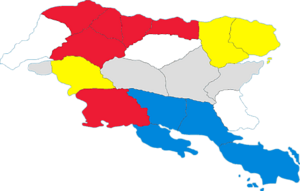Gylian federal election, 2016
| |||||||||||||||||||||||||||||||||||||||||||||||||
All 500 seats in the Chamber of Deputies 251 Chamber of Deputies seats seats needed for a majority | |||||||||||||||||||||||||||||||||||||||||||||||||
|---|---|---|---|---|---|---|---|---|---|---|---|---|---|---|---|---|---|---|---|---|---|---|---|---|---|---|---|---|---|---|---|---|---|---|---|---|---|---|---|---|---|---|---|---|---|---|---|---|---|
| Turnout | 95,0% | ||||||||||||||||||||||||||||||||||||||||||||||||
| |||||||||||||||||||||||||||||||||||||||||||||||||
 | |||||||||||||||||||||||||||||||||||||||||||||||||
| |||||||||||||||||||||||||||||||||||||||||||||||||
Federal elections were held in Gylias on 22 January 2016, to elect the 500 members of the Chamber of Deputies.
The incumbent Toni Vallas government was re-elected with minor changes in seats.
Electoral system
The Chamber of Deputies was elected through single transferable vote, using the Droop quota and 5-member circonscriptions, drawn by Elections Gylias based on regional populations.
Parties were not allowed to nominate more than one candidate per seat. Candidates were not allowed to serve in the Senate simultaneously.
Parties
Background
Toni Vallas had led the Progressive Alliance to a plurality in 2012 and formed Gylias' first federal traffic light coalition. Although the government was technically a minority, it was assured of support from leftist Non-inscrits.
Toni's term was marked by domestic successes in promoting Gylias' transformation into a circular economy and reforming the Social Partnership Program, although her proposal to convert social security to a basic income model was stalled by opposition from municipal and regional governments that feared losing their ability to experiment with local policies.
Campaign
With the established electoral blocs having the same foresitters as before, the campaign was largely muted in character.
National Bloc leader Stéphanie Daniau criticised Toni's support for degrowth, and argued instead for promoting a steady-state economy similar to the Megelanese model.
Results
In accordance with electoral law, the results were embargoed until the full counting and transfers were completed, and were released all at once on 24 January.
| Parties and blocs | Chamber of Deputies | |||||
|---|---|---|---|---|---|---|
| FPV | % | ± | Seats | ± | ||
| Progressive Alliance | 4.350.589 | 24,8% | 88 | |||
| Liberal Union | 3.666.424 | 20,9% | 76 | |||
| Non-inscrits and independents | 3.543.625 | 20,2% | 185 | |||
| National Bloc | 3.455.911 | 19,7% | 85 | |||
| Centre Group | 2.333.179 | 13,3% | 64 | |||
| Union for Freedom and Prosperity | 105.256 | 0,6% | 2 | |||
| Revolutionary Rally | 70.171 | 0,4% | 0 | |||
| Front for Renewal of Order and Society | 17.543 | 0,1% | 0 | |||
| Total | 17.542.697 | 100% | — | 500 | — | |
| Registered voters and turnout | 18.618.670 | 95,0% | ||||
Analysis
The Sunday Thought famously described the election as "like watching a glacier melt" due to the minimal changes it produced. All blocs registered swings of less than 1% in their first preference vote, and in total only 3 seats changed hands.
The PA comfortably maintained its plurality, increasing it by 0,2%, but lost 2 seats. The LU increased its first preference vote by 0,6%, bringing it to second place, and gained a seat. The non-inscrits' vote declined by 0,7%, pushing them to third place, but they maintained the largest collective number of seats at 185. The NB's vote declined by 0,1% and it lost 1 seat.
The electoral map changed little from 2012. Three regions returned a tie for the first time since 2004: Mişeyáke (overturning a PA plurality), Tandar and Herlan (overturning an NB plurality).
Aftermath
The new Parliament was sworn in on 1 February 2016, and the Toni Vallas government was returned to office.
Stéphanie resigned as the NB's leader following the election defeat, leading to a primary election in 2017 that was won by Lena Haidynraix.


